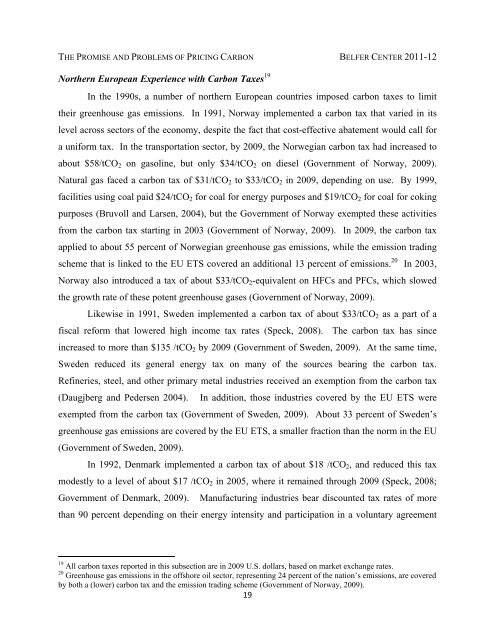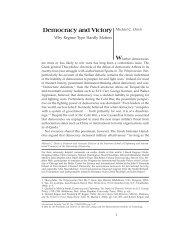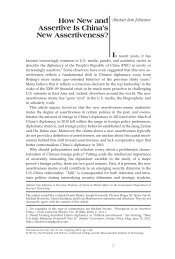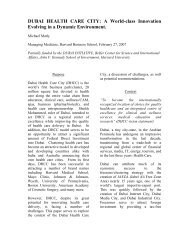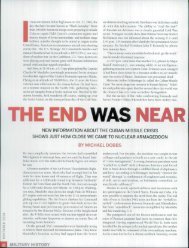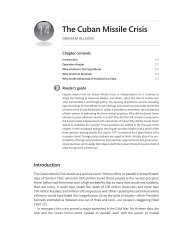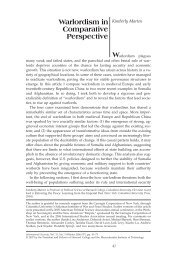The Promise and Problems of Pricing Carbon: - Belfer Center for ...
The Promise and Problems of Pricing Carbon: - Belfer Center for ...
The Promise and Problems of Pricing Carbon: - Belfer Center for ...
Create successful ePaper yourself
Turn your PDF publications into a flip-book with our unique Google optimized e-Paper software.
THE PROMISE AND PROBLEMS OF PRICING CARBON BELFER CENTER 2011-12<br />
Northern European Experience with <strong>Carbon</strong> Taxes 19<br />
In the 1990s, a number <strong>of</strong> northern European countries imposed carbon taxes to limit<br />
their greenhouse gas emissions. In 1991, Norway implemented a carbon tax that varied in its<br />
level across sectors <strong>of</strong> the economy, despite the fact that cost-effective abatement would call <strong>for</strong><br />
a uni<strong>for</strong>m tax. In the transportation sector, by 2009, the Norwegian carbon tax had increased to<br />
about $58/tCO2 on gasoline, but only $34/tCO2 on diesel (Government <strong>of</strong> Norway, 2009).<br />
Natural gas faced a carbon tax <strong>of</strong> $31/tCO2 to $33/tCO2 in 2009, depending on use. By 1999,<br />
facilities using coal paid $24/tCO2 <strong>for</strong> coal <strong>for</strong> energy purposes <strong>and</strong> $19/tCO2 <strong>for</strong> coal <strong>for</strong> coking<br />
purposes (Bruvoll <strong>and</strong> Larsen, 2004), but the Government <strong>of</strong> Norway exempted these activities<br />
from the carbon tax starting in 2003 (Government <strong>of</strong> Norway, 2009). In 2009, the carbon tax<br />
applied to about 55 percent <strong>of</strong> Norwegian greenhouse gas emissions, while the emission trading<br />
scheme that is linked to the EU ETS covered an additional 13 percent <strong>of</strong> emissions. 20 In 2003,<br />
Norway also introduced a tax <strong>of</strong> about $33/tCO2-equivalent on HFCs <strong>and</strong> PFCs, which slowed<br />
the growth rate <strong>of</strong> these potent greenhouse gases (Government <strong>of</strong> Norway, 2009).<br />
Likewise in 1991, Sweden implemented a carbon tax <strong>of</strong> about $33/tCO2 as a part <strong>of</strong> a<br />
fiscal re<strong>for</strong>m that lowered high income tax rates (Speck, 2008). <strong>The</strong> carbon tax has since<br />
increased to more than $135 /tCO2 by 2009 (Government <strong>of</strong> Sweden, 2009). At the same time,<br />
Sweden reduced its general energy tax on many <strong>of</strong> the sources bearing the carbon tax.<br />
Refineries, steel, <strong>and</strong> other primary metal industries received an exemption from the carbon tax<br />
(Daugjberg <strong>and</strong> Pedersen 2004). In addition, those industries covered by the EU ETS were<br />
exempted from the carbon tax (Government <strong>of</strong> Sweden, 2009). About 33 percent <strong>of</strong> Sweden’s<br />
greenhouse gas emissions are covered by the EU ETS, a smaller fraction than the norm in the EU<br />
(Government <strong>of</strong> Sweden, 2009).<br />
In 1992, Denmark implemented a carbon tax <strong>of</strong> about $18 /tCO2, <strong>and</strong> reduced this tax<br />
modestly to a level <strong>of</strong> about $17 /tCO2 in 2005, where it remained through 2009 (Speck, 2008;<br />
Government <strong>of</strong> Denmark, 2009). Manufacturing industries bear discounted tax rates <strong>of</strong> more<br />
than 90 percent depending on their energy intensity <strong>and</strong> participation in a voluntary agreement<br />
19<br />
All carbon taxes reported in this subsection are in 2009 U.S. dollars, based on market exchange rates.<br />
20<br />
Greenhouse gas emissions in the <strong>of</strong>fshore oil sector, representing 24 percent <strong>of</strong> the nation’s emissions, are covered<br />
by both a (lower) carbon tax <strong>and</strong> the emission trading scheme (Government <strong>of</strong> Norway, 2009).<br />
19


